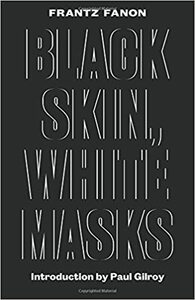Take a photo of a barcode or cover
challenging
dark
informative
sad
slow-paced
challenging
informative
reflective
slow-paced
informative
reflective
medium-paced
informative
reflective
medium-paced
challenging
informative
reflective
slow-paced
Really amazing. Craving a new direction for reading theory that takes Fanon's insights into account when discussing the Self as an operant rather than insular, strictly phenomenological interpretations—but still (unlike most of them poststructurals) gives the Self an agency outside of historical accident.
challenging
dark
reflective
slow-paced
Some remarkable ideas hidden behind some questionable phrasing. The ideas age well, the sentences do not. Still, I understand why this is seen as a classic.
Graphic: Hate crime, Sexual content, Sexual violence, Slavery, Violence, Xenophobia, Antisemitism, Colonisation
Moderate: Sexual assault, Sexual harassment
Minor: Incest, Suicide
challenging
informative
reflective
medium-paced
it turns out that psychoanalytic techniques work a lot better when done by black marxists rather than Freud
Newsweek's blurb on the cover of this edition charachterizes this book well--"strange, haunting mélange of analysis, revolutionary manifesto, metaphysics, pride poetry, and latest criticism--and yet the nakedest of human cries."
Anyone interested in psychoanalytics, Hegelianism, Black Marxism would do well to check out this text. it is probably best read with an eye to intersectional theory.
Sadly, I feel as if I only understand the text marginally more than I did when I first read it at the beginning of undergrad, though my patience and capacity for empathetic reading, especially with regards to dialectical thought, have at least increased. Certainly this is a tome that deserves many re-readings, and I hope to come back to it again in time.
when I do so, some questions I would like to think through;
-to what degree is Fanon and the psychoanalytic tradition enmeshed in (pseudo-) clinical homophobia, phallocentrism, and patriarchy, especially with regards to chapters 6?
-attentively, what possibilities, assumptions, and limitations are there in a queered reading of Fanon?
-how have anti-humanists engaged with and made use of Fanon (and *Masks* in particular)?
-does chapter 8 provide the possibility of a dialectical universalism, or merely the broad and obscuring particularity that is humanism?
-likewise re chapter 8, does Fanon's prescription, such as it is, overemphasize representation to the detriment of redistribution, and does he perhaps mistake repression for rennuncitation?
I suspect that re-reading The Wretched of the Earth (also last encountered early in undergrad) will help me work through these and other questions.
Anyone interested in psychoanalytics, Hegelianism, Black Marxism would do well to check out this text. it is probably best read with an eye to intersectional theory.
Sadly, I feel as if I only understand the text marginally more than I did when I first read it at the beginning of undergrad, though my patience and capacity for empathetic reading, especially with regards to dialectical thought, have at least increased. Certainly this is a tome that deserves many re-readings, and I hope to come back to it again in time.
when I do so, some questions I would like to think through;
-to what degree is Fanon and the psychoanalytic tradition enmeshed in (pseudo-) clinical homophobia, phallocentrism, and patriarchy, especially with regards to chapters 6?
-attentively, what possibilities, assumptions, and limitations are there in a queered reading of Fanon?
-how have anti-humanists engaged with and made use of Fanon (and *Masks* in particular)?
-does chapter 8 provide the possibility of a dialectical universalism, or merely the broad and obscuring particularity that is humanism?
-likewise re chapter 8, does Fanon's prescription, such as it is, overemphasize representation to the detriment of redistribution, and does he perhaps mistake repression for rennuncitation?
I suspect that re-reading The Wretched of the Earth (also last encountered early in undergrad) will help me work through these and other questions.







